Michael Birkel on Quakers, Mysticism, and Reading the Bible
x
As a professor at Earlham College, Michael Birkel was known for his dynamic and thoughtful teaching style. As an author, he is known for capturing Quaker theology and practice in an accessible way.
Today, we’ve got this thoughtful Quaker scholar on the show to share his thoughts on mysticism, spiritual reading, and giving the next generation of Quakers room to express their faith.
Subscribe so you don’t miss an episode!
Leave a comment below to share your thoughts!
Download the transcript and discussion questions.
Discussion Questions
- Michael describes a form of associative reading that begins with one Biblical passage and moves from passage to passage following one word or idea. Try this practice of spiritual reading. Begin with a favorite passage and consider how it might connect to other texts, songs, or experiences.
- Michael says, “My prayer for myself is that I can be open to where the Spirit may be moving. And be supportive of younger Friends who are working to articulate a Quakerism that works for the days that lie ahead for them.” What is your prayer for Quakerism and for yourself as a Friend?
Michael Birkel: The early Quaker communities, the early centuries are offered a kind of balance between that inward life of introspection, contemplation, and also intense experience of divine presence, that on the one hand, and the life of actively seeking a better world on the other. That’s the conversation that continues to go on for me. That balance between the life of a contemplative, and the life of someone who believes that the world can be more just and more peaceful, and that we can do something about that.
Various: Thee Quaker Podcast. Story, spirit, sound.
Jon Watts: Hello! I’m Jon Watts, we’re giving Georgia a break this week from hosting.
I am really excited about today’s episode. So a quick story: Back in 2013 when I first had the idea for a Quaker YouTube channel, which is the idea that eventually became QuakerSpeak, I knew I needed to have some footage that would demonstrate the idea of the project.
So I reached out to some Quakers I knew in West Philadelphia and set up my flip cameras and shot some interview footage, but it wasn’t really clicking somehow. So I started paying attention to the lineup at Pendle Hill, which is a local Quaker retreat center. They always have big name Quakers coming through to lead workshops and give talks.
And when I saw Michael Birkel’s name on the list, I knew that I had to reach out. I had heard about Michael’s work when I was a student at Guilford College and as far as I was concerned, his was one of the biggest Quaker names I could think of.
As a professor at Earlham College, Michael was known for his dynamic and thoughtful teaching style, and as an author he was well known for capturing Quaker theology and practice in an accessible way. So I thought, you know, now’s my chance! I was a little nervous, like here I was, pretty fresh out of college, without much of a grasp of the wider Quaker world, and I was trying to get an interview with someone who is like, you know, “Quaker famous.”
So Michael’s response was warm and generous, and even though I probably didn’t do a very good job of explaining the project idea, he still arranged his busy schedule so that he could meet with me for an hour.
That interview with Michael Birkel in March of 2013 was significant to me in so many ways. First of all, it was the first in several videos I filmed with Michael, ranging in topics from John Woolman to reading the Quran, which have now amassed nearly half a million views, but it was also the first time I remember interviewing someone on camera and feeling chills go down my spine. Like “this person is ministering to me right now.”
The teaser that I put together later that year relied heavily on the footage with Michael, and helped funders and potential parent organizations understand the vision that I had for that video series. So I feel I owe a great deal to Michael, and as Quakers, I think we all do.
When I learned that Michael would be on the campus of Earlham College this Summer when Georgia and I were there for Ohio Valley Yearly Meeting, I jumped at the chance for another conversation. I caught up with Michael next to the Mary Dyer statue.
Michael: Okay, we are on one of the porches at Stout Meetinghouse on the campus of Earlham College, and we’re about to enter inside to where I worship every Sunday, and where my children grew up as Quakers and where I got married in 1982.
When I enter this room frequently, I think of the people who sat here over the decades, pillars of the meeting back when Quaker giants walked the earth. And people who showed me, they didn’t really tell me, they showed me a Quaker life. And it makes me very grateful.
Jon: I can really resonate with Michael’s description her of “when Quaker giants walked the earth,” not because we’re talking about the same giants. Michael is talking about Quakers like Hugh Barber and Alan Koepp and others from the World War II generation, but because I identify with the sentiment. When I’m in the presence of someone who has cultivated their spiritual life for decades, I can feel it, and it makes me want to go deeper into my own journey. Maybe that’s why we call them “weighty” Friends.
It’s thanks to my own encounters with “Quaker giants” that I decided to commit to a Quaker path, and it’s the reason I’m doing the work I do today. Among those Quaker giants for me, is Michael Birkel. So with that said, let’s get into it! I started by asking Michael about his path to teaching and writing about Quakerism.
Michael: I got into the study of religion as an accident. I was actually in graduate study at a distinguished university in music history. And I was in a class of 20th century music. This was in the 1970s. And the composer for the day that we were studying was Olivier Messiaen was a French avant garde composer who gave mystical titles to his compositions like “Quartet for the End of Time,” “Nine Meditations on the Blessed Trinity,” and he was a fascinating composer. I would listen to his music and say, Wow, that was really great. Could you please give me my sense of time and space back? So that’s what it was like to listen to him.
I was in this graduate seminar and everyone else from the teacher to all the students thought that this mystical dimension of him was just an ironic French facade. And I left that seminar that day thinking these are not my people. Now, what do I do?
Well, I had been among Friends for a number of years and I knew there was a master’s program in religion at Earlham. And I thought, wow, would they let me in. Well, you can go to seminary having majored in anything, I didn’t know that at the time, so they let me in. And that kind of launched me in the study of religion. And I had wonderful mentors, particularly Hugh Barber, who has taught me about Quakerism, first as a student and then later when I joined the faculty at the college, one of the smartest people, most brilliant people I’ve ever met.
Jon: Michael’s work has often focused on the intersection of Quaker spirituality and other faith traditions, and that interest formed in him one summer during his time in college when he picked up two books on religion at the library.
Michael: One was a collection of sayings and stories of the early desert monastics of ancient Egypt, whom I somewhat playfully call the desert moms and dads. And I also read the journal of John Woolman. And I think for the past half century, those two books have been carrying on a conversation inside of me. And in graduate school, I pursued studies of ancient Christianity and wrote about the early monastic life and spirituality. The early monastics were, I think, kind of the research and development department of what it means to be a human being.
They were intense observers of the inward life, and had a lot to say that’s valuable about the potential disturbers of the peace of the soul, and how to respond to them in ways that can bring you into greater tranquility and insight. And then, of course, the early Quaker communities, the early centuries are offered a kind of balance between that inward life of introspection, contemplation, and also intense experience of divine presence, that on the one hand, and the life of actively seeking a better world on the other. That’s the conversation that continues to go on for me. That balance between the life of a contemplative, and the life of someone who believes that the world can be more just and more peaceful, and that we can do something about that.
Jon: So you’ve written many books, the one that most Quakers might be familiar with, and because it’s often referred to newcomers, and it’s called Silence and Witness, is that right? So tell me a little bit about Silence and Witness and why did you choose that title?
Michael: Well, it’s a book that grows out of my teaching. I called it Silence and Witness, referring to how Meeting for Worship begins. It’s not the sole aspect of our, of our worship, but certainly it frames it. And so the silence was meant to acknowledge our form of of gathering and worshiping. And witness was meant to honor our tradition of testimony to the world: engaging the wider world to make it better.
And so, the book talks about meeting for worship. What is that? What is discernment among Friends? What are patterns that Friends have developed of nurturing the inward life? A particular part of the book is kind of tucked in at the end that I enjoyed. I called it the facing bench, because it gave me a chance to pair Quaker writers from across the centuries, and to include voices that don’t always get mentioned, when you’re talking about the Quaker giants of the past or present.
Jon: My favorite question that I’ve ever asked you was about early Quakers, and this idea of form and substance. It was something I was wrestling with a lot in, in college and wanted to pose that question to you again, in a more in a more spacious format here. What did early Friends mean when they said that the church was “all form and no substance”? And what did it mean to double down and fully commit to the substance of the religious experience?
Michael: Going back to ancient monastics, Serapion of Thmuis, whom I’m sure all your audience will know, of Serapion of Thmuis wrote some prayers that continue, he was an Egyptian, an ancient Christian, and one of his prayers has these words in it, “We pray you make us more truly alive.” And that is, I think, what early Friends were for, where is that vitality? Where is that? How does Spirit come to life? And they weren’t getting it in the places where their society told them to look for it, you know, find it in conventional religion, conventional religious practice.
I don’t want to deny that that happens for people. I mean, we wouldn’t have any liturgical Christians left if they didn’t find some meaning in it. But just as Quaker forms of worship can fail to speak to some people at some times in their lives. So also, structured forms, highly structured forms, can feel lifeless or for others. And so that’s what the early Friends wanted. They wanted to be made more truly alive to quote Serapion of Thmuis, whom they did not know. I’m quite sure.
Jon: After the break, Michael teaches us to read the Bible like a 12th century mystic and shares his prayer for the future of Quakerism.
Georgia: So hello, how are you today?
Dan: Consiglio: I’m doing well. How are you?
Georgia: Yeah, I’m doing great. Thanks for coming out and glad we could coordinate.
Dan: Absolutely.
Georgia: And you’re a teacher. Is that right?
Dan: I am. Yeah, I teach middle school.
Georgia: Bless you.
Dan: That’s everybody’s response.
Georgia: This is Dan Consiglio, a member of Lansdowne Friends Meeting in Pennsylvania. Dan first encountered Quakers at Swarthmore College about 25 years ago, when he and his now wife were students. That was where he attended his first meeting at Swarthmore Friends.
Dan: So it’s unprogrammed. They didn’t give a query, it was just like, people came in, sat down, some folks smiled at me, and I sat there for about 10 minutes, I was like, Oh, wow, this is real, like, we are actually going to sit here in silence for an hour. The messages themselves didn’t really speak to me, but it was I think, the just the, just the idea that like Quakers, you know, we didn’t get rid of the clergy, we got rid of the laity. So it’s like, everybody gets to stand up and talk. And, you know, and I think like, just that felt really empowering to me.
Georgia: Years later, when Dan and his wife were interested in providing a spiritual background for their young kids. They decided to look into the school at Lansdowne Friends Meeting.
Dan: I think just that the people that we met, there were just wonderful people who like said all the right things. And, you know, were really very caring and asked a lot of interesting questions. And so we’re like, oh, there’s a meeting connected there. Let’s try this meeting out. And similarly, you know, walked in and just like were welcomed by so many people,
Georgia: Within a year, they were fully involved and had even joined committees,
Dan: I think the thing that’s always drawn me spiritually to Quakerism is just that. Every time I walk out of a meeting, I feel like I’m still in worship mode. Like, I feel like you never really kind of leave worshipful practice as a Quaker, just this idea that, like, I never, I’m not really off the hook, like I have to, like, if I believe a thing, I have to act on the thing that’s really brought me a lot of satisfaction in my life that I’m not sure that I had before. And I think it’s made by relationships, even with like my non-Quaker friends, like I think closer and like I’m more able to, I guess, open up emotionally and like, have conversations with people that are, you know, a little more, I guess, spiritually and politically brave. If that makes sense.
Georgia: Dan is one of our new podcast supporters. And I asked him why it’s important to have and support Quaker media.
Dan: I mean, one of the cool things, actually, I really appreciate it. Like, I’ve never heard a message from a program to meeting before. That was just really neat exposure. I knew that Quaker practice was different outside of this area. And even across the country, like there are lots of programmed Quakers and United States of America. A lot of that really helped me understand like, oh, yeah, like they’re still Quaker. Like, they just, it’s a little different. Like they worship all differently, but it’s at the core, it’s still the same thing. I mean, through your shows the only exposure I ever had to that, so that was really cool. Awesome.
Georgia: Yeah, thank you for that.
What made you decide to become Thee Quaker Podcast monthly supporter?
Dan: I think that the work you all are doing is super important. You know, podcasts, I think, have a really powerful ability to reach out to folks who maybe feel isolated and show them that they’re not isolated. And you know, there can be a there is a larger community that’s happy to, to welcome them. And I think that I think you guys are doing some really great, great work to bring that to more people and I think, make that a more, I guess enriched conversation. The deep stuff is what you guys are doing. That’s really awesome. And I can contribute financially. So I’m going to.
Georgia: We’re so thankful for Dan and the many of you who have recently signed up to become podcast supporters. We know that not everyone could give, but if you’re able, please consider it. We really feel that it does fill any just stand said, to help bring connection to those who feel isolated to those who are looking for like minded people, to those who are looking for stories that will really resonate with them. So if you’re able to give head over to QuakerPodcast.com. It only takes a couple of minutes and we’re so grateful for you.
Jon: I want to ask you about Quakers and mysticism. Something that you’ve written about even recently, Quakers Reading Mystics is a pamphlet that you recently published. So what’s what’s important to the Quaker faith and maybe even essential about mysticism?
Michael: Well, first of all, I want to acknowledge, it’s perfectly acceptable to be a Quaker and not be a mystic. It’s not a requirement. It has attracted many people who are themselves attracted to an interior life that aspires to a kind of transforming experience, a transformative experience of divine presence that feels like some kind of union.
I think that it has been an element of Quakerism from its very earliest days. I have been interested in how other people have described their transformative experiences. I want to listen to them, I want to learn from them. I’m interested in mysticism very seriously. But I’m also interested in a kind of spirituality of reading, what happens, or what might happen, how do we, what do we open ourselves to receive when we read the words of someone from long ago and far away?
Jon: Speaking of which, you’ve done some work on how Quakers read the Bible. Specifically, you’ve written this book, engaging scripture, reading the Bible with early Friends. Tell me about that project. What unlocks for you when you invite 17th century Quakers into the room when you’re reading scripture?
Michael: I’ll back up a little bit to the 12th century.
Jon: Of course, you will.
Michael: In my studies in graduate school, which did not begin in the 12th century, but in my studies, I happened to build upon a book by French monastic scholar Jean Leclercq, and it was called The Love of Learning and the Desire for God. And there’s a chapter on meditative reading among medieval monastics, and how they read in an associative way.
You might begin with a passage from one of the Psalms: “By the rivers of Babylon, we sat and wept when we remember you, oh Zion,” for example. And they would get to the word river. And they would be thinking of the Tigris and Euphrates, because you know, these are the rivers of Babylon. These are the rivers that separate them from their homeland, because they are in exile. But as they sit with that image of a river, they might remember, oh, wait a minute, there’s also the Red Sea, and crossing the Red Sea, out of captivity into freedom into the wilderness, they call the desert. And wandering in the wilderness until they made their way into this land of promise. They might also think about John the Baptist at the River Jordan, they might also think about the river that flows clear as crystal from the throne of God and the land, and the book of Revelation, you know, this heavenly city, that is all joy and delight.
And so all of these images would be interacting with one another interiorly for them, commenting on one another, and they would all be somehow connected to their experience because they would be thinking, What is my Exodus? To what am I enslaved? Where is my freedom? What is my exile? What is my homecoming? What is my encounter with this wild man in the desert, John the Baptist, and that kind of layering of images can be very edifying. It invites one into a kind of very spacious experience in this interplay of the text of the sacred text of the community, personal experience, historical memory, they all come together.
There was a monk, William of Saint-Thierry. And he said, you know, you really can’t understand the writings of the apostle Paul, unless you’re under the influence under the encounter under the guidance of the Spirit that gave them forth.
And I thought, wait a minute, that sounds a lot like George Fox, where he says, isn’t in his journal, you know, that he was reading scriptures in the spirit in which they were given forth. And I thought, well, that’s a coincidence.
George would not have read that text, we’re pretty sure he didn’t know Latin. And then I found these passages in early Quaker writings that are just dense with that kind of layered-ness of imagery from Scripture.
And I thought, if this is how they talk about it, which looks very similar to what these folks were doing in the 12th century, and other centuries. Was their experience of reading comparable, was the frame of expectation that they brought to opening this book? Was it similar in some ways? And I slowly came to think that the answer is yes.
Jon: So this approach of kind of contemplative reading, where the words on the page, conjure references and images that that may not be immediate, immediately obvious because you’re pulling from different sources and different people how has that impacted the way that you read the Bible and, and how do how do early Friends join you in that activity?
Michael: There’s a phrase Margaret fell uses in one of her letters, she says, “read within,” or later in the same letter, she says, “and this thou must read within thine own bosom” There’s this tradition of reading among Friends and others, in which scripture becomes a shared language for describing the inward life.
And that’s no longer the case among really, among most Friends, on the one hand, the more liberal Friends have, have distanced themselves from scriptural texts in some ways. And among some other, evangelical Friends, influenced by the, by that evangelical theology, Scripture becomes so holy, that you can’t play with it anymore. And this is a playful way of reading, a reverently playful way of reading, where you allow your awareness to be a bumblebee going from flower to flower in this biblical bouquet. And I find that to be a valuable way of reading because it explores the interplay of memory, memory of inward experience, and desire and desire for a similar encounter in the moment. And memory and desire are to me, a form of prayer, a form of worship.
Jon: Who’s in the room with you when you’re reading scripture?
Michael: Well, Margaret Fell, George Fox is there. How many names do I drop? Samuel Fisher, Dorothy White, Sarah Blackburn, lots of early Friends. John Woolman, of course, is there, as well as many of his contemporaries, Elias Hicks is there. But because I have been a student of other religious communities across history, other people are in there in the room as well.
The medieval mystic, Hildegard of Bingham? is there because she read like that. Meister Eckhart is in the room. Moshe De Leon, the author of, of the Jewish texts, the Zoho is in the room. All these people who have taught me how to read in this fashion, and who are whose example kind of lives in my memory that is awakened when I open the biblical text.
Jon: Michael, what’s your prayer for the future of Quakerism?
Michael: Ah, wow. Quakerism has changed and has always changed over the centuries. It’s always been in conversation with its context, as it has always been influenced by its context, whether that be puritanism and its early days, whether it be the angelic or revival of the 19th century, whether that be the emergence of modern liberal Protestantism in the early 20th century. Quakerism has responded to what’s happening around it. And so Quakerism will change.
My prayer is that Friends will find a balance that works for them. A balance that preserves, what is what ought to endure of its inheritance. And this openness to insights to, to what is new, what does what does the Spirit require of us, but also, what does this day, this time require of us so that we’re neither frozen in the past, nor rootless followers of changeable fashion. There’s some, some balance to be had there.
I’ve had my turn to be part of a Quakerism that worked for me and I don’t really get to decide what happens next. I’m officially old now.
If there’s someone I want to be like, it would be Alan Jay, who lived mostly in the 19th century, was born in the final flourishing of Quaker quietism. And when he was a young person, the train that came through town was the Evangelical revival and he got on board. This is not this is a piety that I respect, but I do not share, okay, just to be clear. He, he hopped on that wagon. He became a very effective revivalist in the 19th century. And there were these young whippersnappers coming through town, people like Rufus Jones and Elbert Russell, who were exploring a liberal and mystical understanding of Quakerism and he supported them.
My prayer for myself is that I can be open to where the Spirit may be moving. And be supportive of younger Friends who are working to articulate a Quakerism that works for the days that lie ahead for them. Even though I realize that those changes are probably not going to be ones that I would choose, because I’ve been happy with what I’ve had, but I want to support where the Spirit is alive and active among Friends. So my prayers for that openness and me and my generation and for that openness in the younger generation, to find that balance between a worthy legacy and the needs of the day.
Jon: Michael, thank you.
Michael: You’re welcome. Always a pleasure to talk to you, Jon.
Jon: It’s mutual.
Thank you for listening, and thank you to Michael Birkel for talking with me. Please head over to QuakerPodcast.com to leave us a comment and let us know what you thought about this episode. While you’re there check out our discussion questions and a transcript.
Today’s episode was reported, written and produced by me, Jon Watts. I had editing help from Georgia Sparling.
Studio D mixed the episode.
Your Moment of Quaker Zen will be read by Grace Gonglewski.
We couldn’t make this show without your support. Please go to QuakerPodcast.com and click the support button at the top right hand of the screen to help us continue this work of spiritually rich conversations.
And now for your moment of Quaker Zen.
Grace Gonglewski: Thomas Brown, 1959: It is just possible that a frantic effort to remove suffering may not be the most loving act. Parents do their children no loving-kindness by overprotecting them. […] Such protection in its extreme form may be the denial of the opportunity to grow in stature and compassion, in solidarity […], in self-understanding, and in the knowledge of God. And we who try to evade suffering at any cost may be rejecting the Truth knocking at our door […]
Jon: Sign up for daily Quaker wisdom to accompany you on your spiritual path, just go to DailyQuaker.com. That’s DailyQuaker.com. We’re taking next week off. We’ll see you in two weeks with our next episode.
Reported, hosted and edited by Jon Watts with editing support by Georgia Sparling.
Original music and sound design by Jon Watts (Listen to more of Jon’s music here.)
Mixed and mastered by Studio D.
Supported by listeners like you (thank you!!)
Referenced in this episode:
- Find Michael Birkel’s books at Bookstore.org.
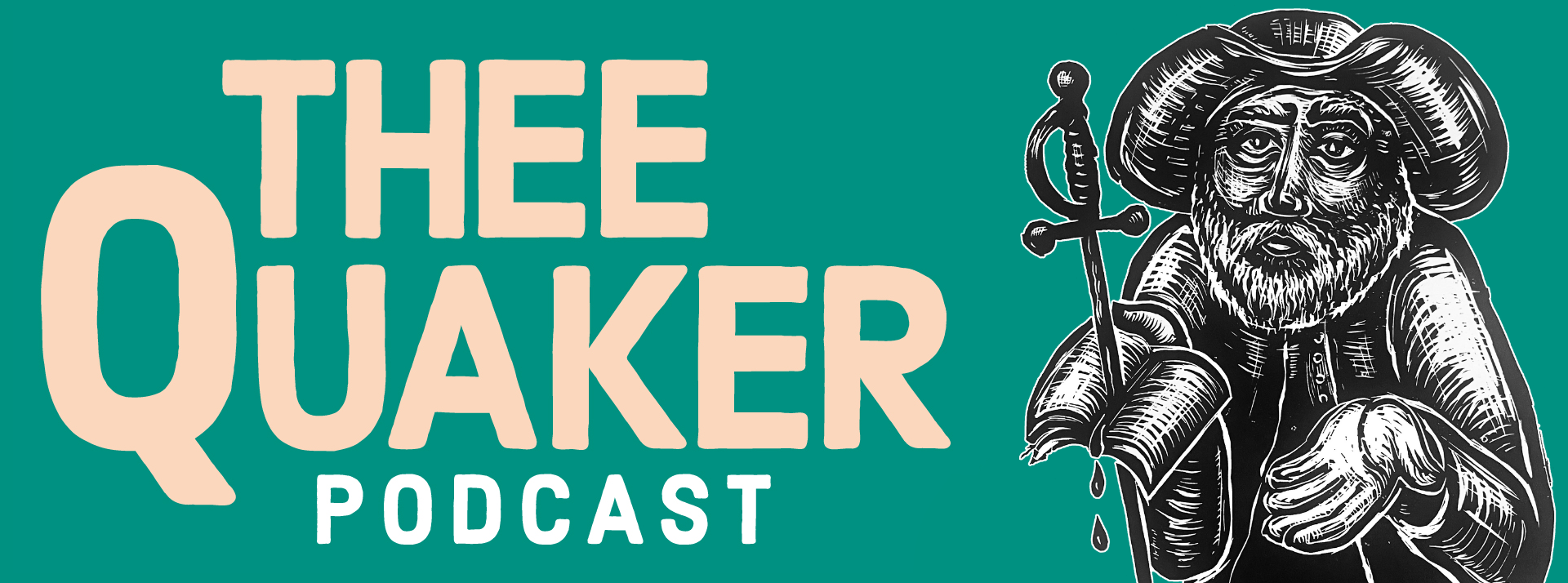

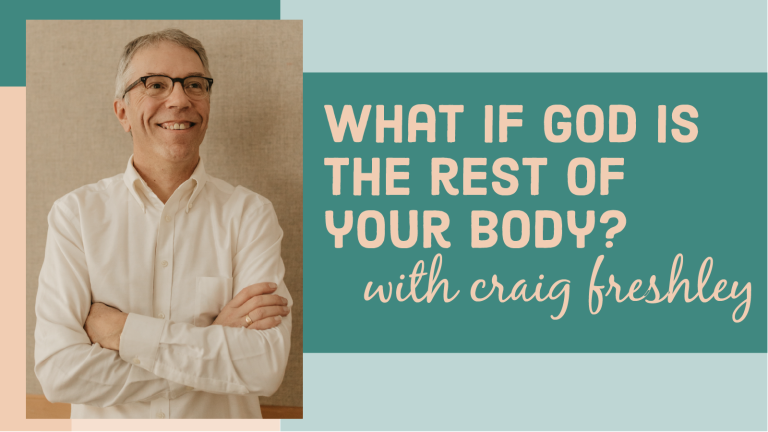
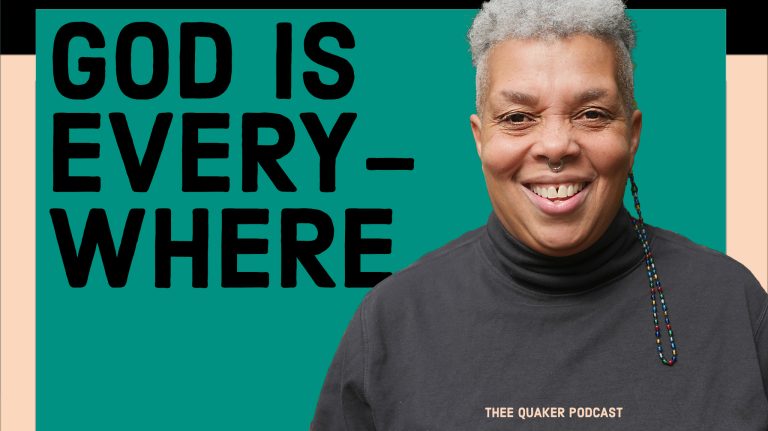
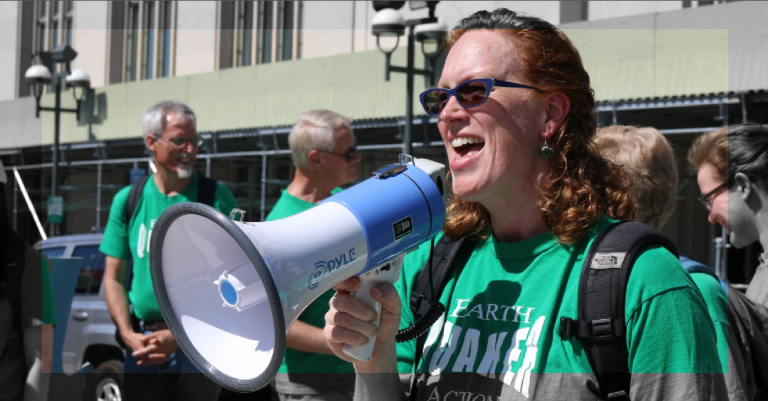
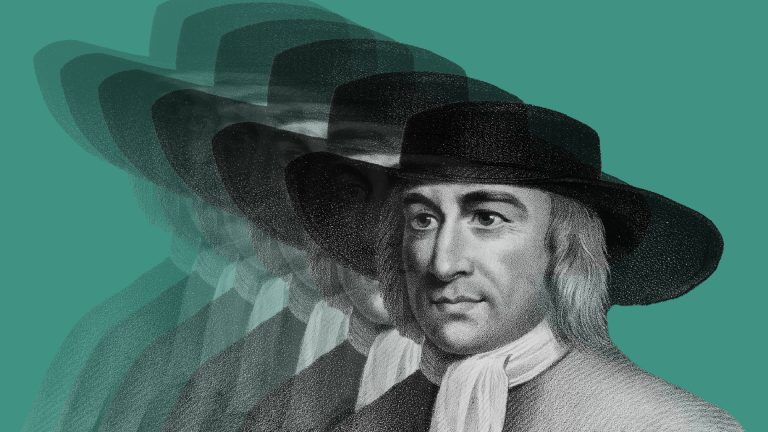
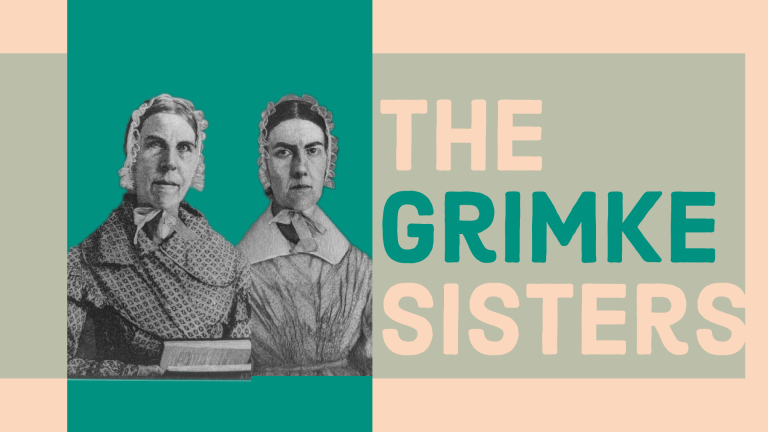
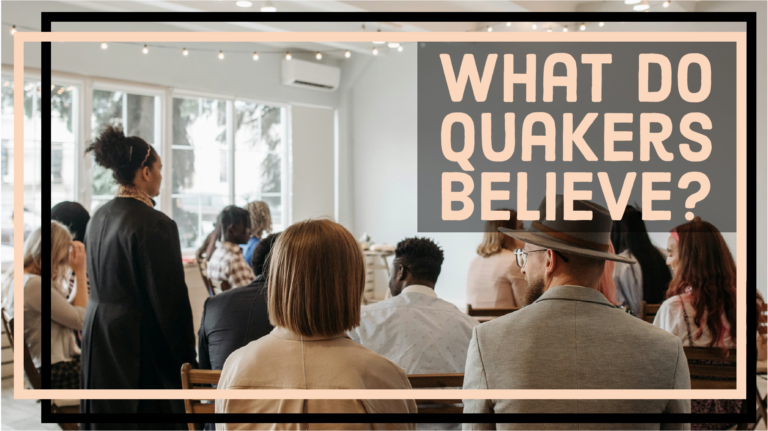
Thank you, Michael and Jon (and also Georgia and Studio D for your roles in this episode). I’m intrigued by Michael’s descriptions of his and early Quakers’ and Leclercq’s Bible reading. The timing of this is perfect, as I am preparing to facilitate the Zoom Bible study at Pacific Yearly Meeting Annual Session.
And congratulations on winning “Best in Class” from the Associated Church Press!
Thanks so much Krista! Hope the PYM bible study goes well
Who is he praying to and what does he mean, when he refers to “the spirit?”
He didn’t mention God, or Jesus in his discussion, s